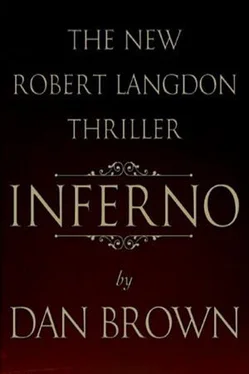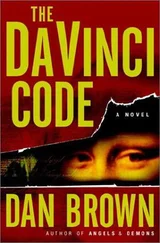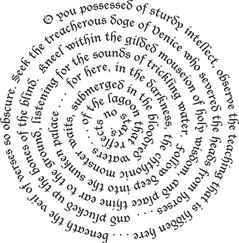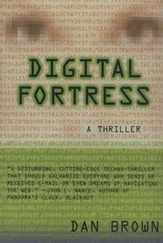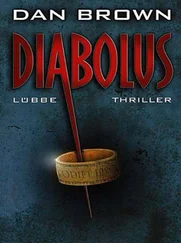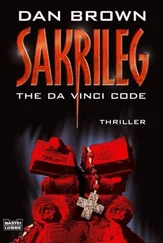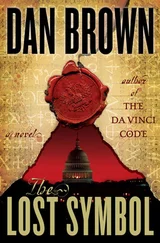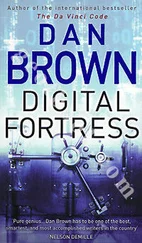“Almost. Its actual meaning is ‘a self-sacrifice for the common good.’ ” She paused. “Otherwise known as benevolent suicide.”
Langdon had indeed heard this term before — once in relation to a bankrupt father who killed himself so his family could collect his life insurance, and a second time to describe a remorseful serial killer who ended his life fearing he couldn’t control his impulse to kill.
The most chilling example Langdon recalled, however, was in the 1967 novel Logan’s Run , which depicted a future society in which everyone gladly agreed to commit suicide at age twenty-one — thus fully enjoying their youth while not letting their numbers or old age stress the planet’s limited resources. If Langdon recalled correctly, the movie version of Logan’s Run had increased the “termination age” from twenty-one to thirty, no doubt in an attempt to make the film more palatable to the box office’s crucial eighteen-to-twenty-five demographic.
“So, Zobrist’s essay …” Langdon said. “I’m not sure I understand the title. ‘Who Needs Agathusia?’ Was he saying it sarcastically? As in who needs benevolent suicide … we all do?”
“Actually no, the title is a pun.”
Langdon shook his head, not seeing it.
“ Who needs suicide — as in the W-H-O —the World Health Organization. In his essay, Zobrist railed against the director of the WHO — Dr. Elizabeth Sinskey — who has been there forever and, according to Zobrist, is not taking population control seriously. His article was saying that the WHO would be better off if Director Sinskey killed herself.”
“Compassionate guy.”
“The perils of being a genius, I guess. Oftentimes, those special brains, the ones that are capable of focusing more intently than others, do so at the expense of emotional maturity.”
Langdon pictured the articles he had seen about the young Sienna, the child prodigy with the 208 IQ and off-the-chart intellectual function. Langdon wondered if, in talking about Zobrist, she was also, on some level, talking about herself; he also wondered how long she would choose to keep her secret.
Up ahead, Langdon spotted the landmark he had been looking for. After crossing the Via dei Leoni, Langdon led her to the intersection of an exceptionally narrow street — more of an alleyway. The sign overhead read VIA DANTE ALIGHIERI.
“It sounds like you know a lot about the human brain,” Langdon said. “Was that your area of concentration in medical school?”
“No, but when I was a kid, I read a lot. I became interested in brain science because I had some … medical issues.”
Langdon shot her a curious look, hoping she would continue.
“My brain …” Sienna said quietly. “It grew differently from most kids’, and it caused some … problems. I spent a lot of time trying to figure out what was wrong with me, and in the process I learned a lot about neuroscience.” She caught Langdon’s eye. “And yes, my baldness is related to my medical condition.”
Langdon averted his eyes, embarrassed he’d asked.
“Don’t worry about it,” she said. “I’ve learned to live with it.”
As they moved into the cold air of the shadowed alleyway, Langdon considered everything he had just learned about Zobrist and his alarming philosophical positions.
A recurring question nagged at him. “These soldiers,” Langdon began. “The ones trying to kill us. Who are they? It makes no sense. If Zobrist has put a potential plague out there, wouldn’t everyone be on the same side, working to stop its release?”
“Not necessarily. Zobrist may be a pariah in the medical community, but he probably has a legion of devout fans of his ideology — people who agree that a culling is a necessary evil to save the planet. For all we know, these soldiers are trying to ensure that Zobrist’s vision is realized.”
Zobrist’s own private army of disciples? Langdon considered the possibility. Admittedly, history was full of zealots and cults who killed themselves because of all kinds of crazy notions — a belief that their leader is the Messiah, a belief that a spaceship is waiting for them behind the moon, a belief that Judgment Day is imminent. The speculation about population control was at least grounded in science, and yet something about these soldiers still didn’t feel right to Langdon.
“I just can’t believe that a bunch of trained soldiers would knowingly agree to kill innocent masses … all the while fearing they might get sick and die themselves.”
Sienna shot him a puzzled look. “Robert, what do you think soldiers do when they go to war? They kill innocent people and risk their own death. Anything is possible when people believe in a cause.”
“A cause? Releasing a plague?”
Sienna glanced at him, her brown eyes probing. “Robert, the cause is not releasing a plague … it’s saving the world.” She paused. “One of the passages in Bertrand Zobrist’s essay that got a lot of people talking was a very pointed hypothetical question. I want you to answer it.”
“What’s the question?”
“Zobrist asked the following: If you could throw a switch and randomly kill half the population on earth, would you do it?”
“Of course not.”
“Okay. But what if you were told that if you didn’t throw that switch right now, the human race would be extinct in the next hundred years?” She paused. “Would you throw it then? Even if it meant you might murder friends, family, and possibly even yourself?”
“Sienna, I can’t possibly—”
“It’s a hypothetical question,” she said. “Would you kill half the population today in order to save our species from extinction?”
Langdon felt deeply disturbed by the macabre subject they were discussing, and so he was grateful to see a familiar red banner hanging on the side of a stone building just ahead.
“Look,” he announced, pointing. “We’re here.”
Sienna shook her head. “Like I said. Denial .”
The Casa di Dante is located on the Via Santa Margherita and is easily identified by the large banner suspended from the stone facade partway up the alleyway: MUSEO CASA DI DANTE.
Sienna eyed the banner with uncertainty. “We’re going to Dante’s house ?”
“Not exactly,” Langdon said. “Dante lived around the corner. This is more of a Dante … museum.” Langdon had ventured inside the place once, curious about the art collection, which turned out to be no more than reproductions of famous Dante-related works from around the world, and yet it was interesting to see them all gathered together under one roof.
Sienna looked suddenly hopeful. “And you think they have an ancient copy of The Divine Comedy on display?”
Langdon chuckled. “No, but I know they have a gift shop that sells huge posters with the entire text of Dante’s Divine Comedy printed in microscopic type.”
She gave him a slightly appalled glance.
“I know. But it’s better than nothing. The only problem is that my eyes are going, so you’ll have to read the fine print.”
“È chiusa,” an old man called out, seeing them approach the door. “È il giorno di riposo.”
Closed for the Sabbath? Langdon felt suddenly disoriented again. He looked at Sienna. “Isn’t today … Monday?”
She nodded. “Florentines prefer a Monday Sabbath.”
Langdon groaned, suddenly recalling the city’s unusual weekly calendar. Because tourist dollars flowed most heavily on weekends, many Florentine merchants chose to move the Christian “day of rest” from Sunday to Monday to prevent the Sabbath from cutting too deeply into their bottom line.
Читать дальше
Конец ознакомительного отрывка
Купить книгу
